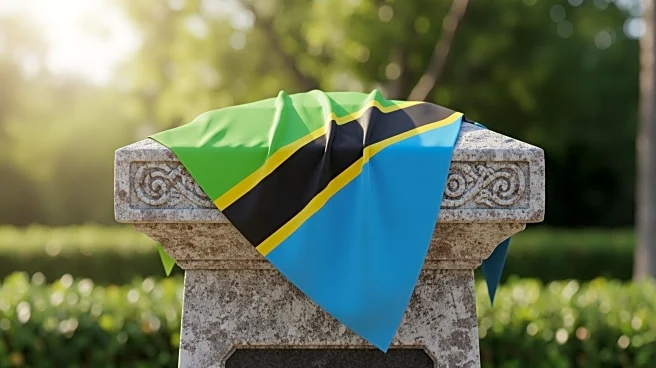What's Happening?
Israeli authorities have confirmed the identification of the remains of a Tanzanian agricultural student, Joshua Loitu Mollel, who was killed during the Hamas-led attack on October 7, 2023. The remains were
returned from Gaza as part of a U.S.-brokered ceasefire agreement. Mollel, who had arrived in Israel just 19 days before the attack, was seeking agricultural experience to apply in Tanzania. His family has been notified of the identification. The Hostages and Missing Families Forum Headquarters expressed that the return of Mollel's remains offers some comfort to his family, who have faced uncertainty for over two years. Currently, six bodies of hostages remain in Gaza, while militants have released 22 bodies since the ceasefire began. The exchange of remains is a central component of the initial phase of the ceasefire deal, which requires Hamas to return all hostage remains promptly.
Why It's Important?
The identification and return of Joshua Loitu Mollel's remains highlight the ongoing humanitarian efforts amidst the conflict between Israel and Hamas. The U.S.-brokered ceasefire aims to facilitate the return of hostages and their remains, providing closure to affected families. This development underscores the complex negotiations and exchanges between the parties involved, reflecting the broader geopolitical dynamics in the region. The return of hostages and remains is crucial for maintaining the ceasefire and potentially paving the way for further diplomatic engagements. The situation also emphasizes the challenges faced by humanitarian organizations, such as the International Committee of the Red Cross, in managing these exchanges under difficult circumstances.
What's Next?
The ongoing exchanges of hostages and remains are expected to continue as part of the ceasefire agreement. Israel and Hamas have accused each other of breaching other terms of the agreement, which could impact future negotiations and exchanges. Health officials in Gaza face challenges in identifying remains due to a lack of DNA testing kits, complicating the process. Israel is pushing for faster returns, while Hamas cites the widespread devastation in Gaza as a hindrance. The international community, including humanitarian organizations, will likely continue to play a role in facilitating these exchanges and monitoring compliance with the ceasefire terms.
Beyond the Headlines
The return of hostages and remains raises ethical and legal questions regarding the treatment of hostages and the responsibilities of militant groups under international law. The situation also highlights the cultural and emotional impact on families awaiting news of their loved ones. Long-term shifts may include increased international pressure on Hamas and Israel to adhere to humanitarian standards and engage in peaceful resolutions. The exchanges could influence public opinion and policy decisions in both regions, potentially affecting future diplomatic relations.









